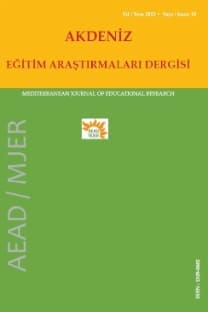Empowering the Use of Reading Strategiesand Literacy through E-Book Novel: An Extensive Reading of the Great Gatsby
___
- Arnot, M. (2011). Global citizenship education and equality: Gendered hegemonies, tensions and a global gender ethic. K. Sporre, ve J. Mannberg içinde, Values, religions and rducation in changing societies (s. 51-65). Springer Netherlands.
- Braskamp, L., Braskamp, D., ve Merrill, K. (2008). Global perspective inventory (GPI): Its purpose, construction, potential uses, and psychometric characteristics. Chicago: Global Perspective Institute.
- Büyüköztürk, Ş. (2007). Sosyal bilimler için veri analizi el kitabı. Ankara: Pegem Akademi Yayıncılık.
- Cogan, J. J. (2000). Citizenship education for the 21. century: Setting the context. J. John, ve R. Derrıcot içinde, Citizenship for the 21. century: An international perspective on education. UK: Kogan Page Limited ve Usa-Stylus Publishing Inc.
- Cole, D. A. (1987). Utility of confirmatory factor analysis in test validation research. Journal of consulting and clinical psychology, 1019-1031.
- Cortina, J. M. (1993). What is coefficient alpha? An examination of theory and applications. Journal of applied psychology, 78(1), 98.
- Deardorff, D. (2006). The identification and assessment of intercultural competence. Journal of Studies in International Education, 241-266.
- Hair, J. F., Black, W. C., Babin, B. J., & Anderson, R. E. (2014). Multivariate Data Analysis - Seventh Edition. Edinburgh Gate: Pearson Education Limited.
- Hunter, B., White, G., & Godbey, G. (2006). What does it mean to be globally competent? Journal of Studies in International Education, 267-285.
- Ibrahim, T. (2005). Global Citizenship Education: Mainstreaming the Curriculum? Cambridge Journal of Education, 177-194.
- Inbaraj, J., Kumar, S., Sambili, H., & Scott-Baumann, A. (2003). Women and Citizenship in Global Teacher Education: The Global-ITE Project. Gender and Development, 83-92.
- Kan, Ç. (2009). Değişen Değerler ve Küresel Vatandaşlık Eğitimi. Kastamonu Eğitim Dergisi, 895-904.
- Lagos, T. (2011). Global citizenship—Towards a definition. Ocak 11, 2011 tarihinde http://depts.washington.edu/gcp/pdf/globalcitizenship.pdf adresinden alındı
- Martin, C. R., & Newell, R. J. (2004). Factor Structure of the Hospital Anxiety and Depression Scale in Individuals with Facial Disfigurement. Psychology Health and Medicine, 327-336.
- Morais, D. B., & Odgen, A. C. (2010). Initial Development and Validation of the Global Citizenship Scale. Journal of Studies in International Education OnlineFirst.
- Mundfrom, D. J., Shaw, D. G., & Ke, T. L. (2005). Minimum Sample Size Recommendations for Conducting Factor Analyses. International Journal of Testing, 5(2), 159-168.
- Nussbaum, M. (2002). Patriotism and Cosmopolitanism. J. Cohen içinde, For Love of Country (s. 2-17). Boston: Beacon.
- Oxfam. (2006). Şubat 11, 2011 tarihinde http://www.oxfam.org.uk/coolplanet/teachers/globciti/downloads/gcguide06.pdf adresinden alındı
- Paige, M., Stallman, E., & Josić, J. (2008). Study abroad for global engagement: A preliminary report on the Study Abroad Global Engagement (SAGE) research project. Washington.
- Schattle, H. (2009). Global Citizenship in Theory and Practice. R. Lewin içinde, The Handbook of Practice and Research in Study Abroad: Higher Education and the Quest for Global Citizenship (s. 3-18). New York: Routledge.
- Sunal, C. S., & Haas, M. E. (2005). Social Studies For The Elemantary And Middle Grades. USA: Pearson Education.
- Tabachnick, B. G., & Fidell, L. S. (2001). Using multivariate statistics (4th ed.). Needham, MA: Allyn & Bacon.
- Ural, A., & Kılıç, İ. (2005). Bilimsel Araştırma Süreci ve SPSS ile Veri Analizi. Ankara: Detay Yayıncılık.
- ISSN: 1309-0682
- Yayın Aralığı: 4
- Başlangıç: 2008
- Yayıncı: Tayfun Taşbilek
Birinci Sınıf Öğrencilerinin Okula Uyumları ve Okuma-Yazma Becerilerinin Kazanımı
Mehtap AKTAŞ, Eda YALÇIN İNCİK
Türkiye'de Kimya Eğitimi Alanında Yapılan Lisansüstü Çalışmalar
Öğrencilerin İnternet Kısıtlamalarına Karşı Geliştirdikleri Yöntemlerin Belirlenmesi
Ortaokul Matematik Öğretmenlerinin Yazılı Sınav Sorularının İncelenmesi
Sınıf Öğretmenlerinin Süreç Temelli Yazmaya Yönelik Görüşlerinin İncelenmesi
